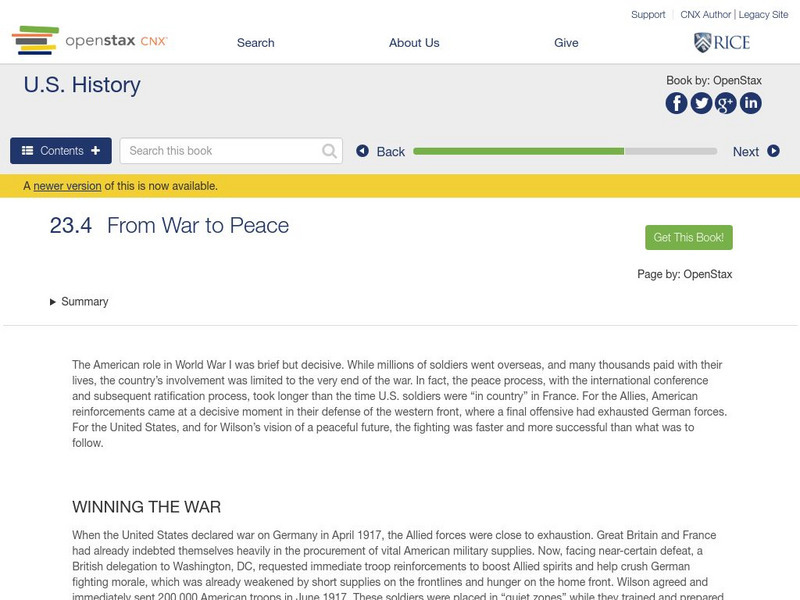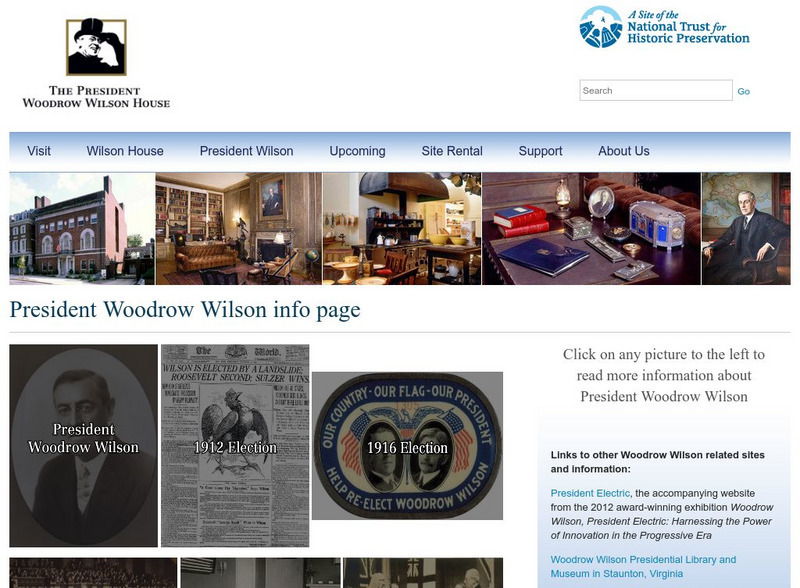Curated OER
United States Entry into World War I: A Documentary Chronology of World War I
Students identify several important events that led to U.S. involvement in World War I. They examine different explanations, form an opinion about the evidence for each rationale and then create a slideshow to present their findings.
Curated OER
World War I - The War Ends
Your class is in for a treat with this outstanding PowerPoint on World War I. The presentation is loaded with facts, maps, important personalities, and discussion questions on the war. Additionally, there is a wonderful video called,...
C-SPAN
Women's Suffrage and the 19th Amendment
The right to vote was hard-won after decades of organizing by women and their allies. Using a series of video clips featuring women's historians, class members consider the efforts behind the Nineteenth Amendment. Possible extension...
Curated OER
The Debate in the United States over the League of Nations: League of Nations Basics
Students examine Woodrow Wilson's ideas for peace and the League of Nations. They examine how he garnered supported of it by looking at images and discussing their context.
Curated OER
United States Entry into World War I: Two Diametrically Opposed Views
Students analyze the events leading to U.S. entry into World War I. They read a speech by President Wilson and an opposition speech, list the reasons each gives for American entry into the war, and complete a Venn diagram.
Curated OER
United States Entry into World War I: A Documentary Chronology
Students complete a unit of lessons on the events that led to U.S. involvement in WWI. They complete a Webquest, conduct research, complete a Venn diagram, read and discuss the reasons for entering the war, and create a slideshow.
Curated OER
The Treaty of Versailles: June 1919
There were four key players involved with the Treaty of Versailles. Present information and critical thinking questions regarding Woodrow Wilson, David Lloyd-George, Georges Clemenceau, and Vittorio Orlando. Included also are lists of...
National Endowment for the Humanities
The Debate in the United States over the League of Nations: Five Camps: From Voices of Consent to Voices of Dissent
Students explore and discuss Woodrow Wilson's concepts for peace and the League of Nations. They understand efforts made to foster American support for the League and discuss the opposition shown in the Senate.
Curated OER
United States Entry into World War I: Some Hypotheses About U.S. Entry
Young scholars determine the most compelling evidence explaining why the U.S. entered WWI. They read and discuss a handout of reasons why the U.S. entered the war, and take a poll as to which reason was the most compelling.
Curated OER
Treaty of Versailles
Students watch and listen to a PowerPoint presentation about the Treaty of Versailles, then write an editorial criticizing the Big Three. Students write from the perspective of a German in 1920 who has just learned of the harsh terms of...
Curated OER
Woodrow Wilson: Prophet of Peace
Students read and discuss various speeches by Woodrow Wilson, and write and present a brief radio address that will persuade the nation to return to world peace. Students analyze current events and discuss whether the world has upheld...
National Endowment for the Humanities
Neh: Edsit Ement: Woodrow Wilson and Foreign Policy
A thorough review of Woodrow Wilson's foreign policies in these four lessons offered by EDSITEment. Learn the origins of "Wilsonianism," Wilson's views on relations with countries in Latin America, Wilson's decision to enter World War I,...
Library of Congress
Loc: Herblock's Presidents
Historically significant collection of political cartoons featuring U.S. Presidents from Library of Congress online teacher-student resources.
US National Archives
Our Documents: Keating Owen Child Labor Act of (1916)
Read the history behind the first child labor bill in 1916 and view the original document.
OpenStax
Open Stax: Americans and the Great War 1914 1919: From War to Peace
Examines how the United States contributed during the final stages of World War I, what Woodrow Wilson believed the world should look like after the war, and why the United States did not sign the Treaty of Versailles or join the League...
PBS
Wnet: Thirteen: Freedom: A History of Us: The Peacemaker
Explore how President Wilson, in his Fourteen Points, urged peace without revenge European self-determination, and the establishment of a peace-keeping League of Nations politicians both abroad and at home rejected his plans.
Digital History
Digital History: Woodrow Wilson and the League of Nations [Pdf]
President Woodrow Wilson had great hopes that a League of Nations would mean that there would be no more world wars. Read about the charter for the League of Nations, especially Article X, which provided the teeth for the organization....
Other
President Woodrow Wilson House: President Wilson
An Overview of the 28th President of the US, Woodrow Wilson. This site includes information about Wilson the Educator, President, War Leader, World Statesman, Nobel Prize Winner, and 20th Century Icon.


















